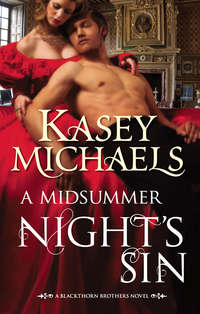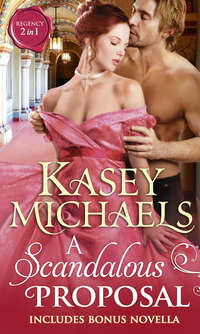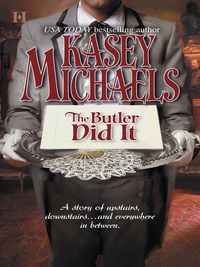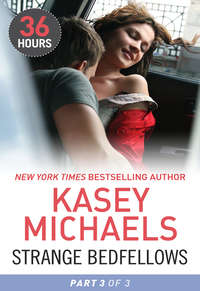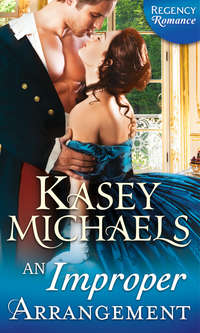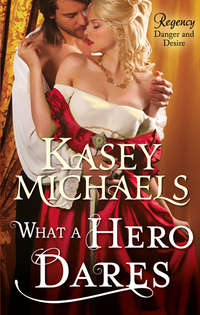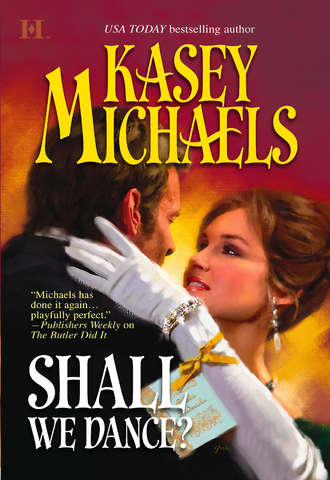
Полная версия
Shall We Dance?
“Well, that’s fairly disgusting.”
“I should say so! Then your father foolishly said the king would be better served to just arrange some fatal accident for the queen and be done with it.”
“And Aunt Rowena heard him? What a dust-up that must have caused.”
“Exactly. Your father is a brilliant man, but can still be extremely obtuse, just like the rest of your sex. And now Rowena’s taken it into her silly head that the queen is in mortal danger. So you see, you have to do it.”
“No.”
“Nate.”
“No.”
“Nathaniel, Rowena is your godmother.”
“Damn.”
AS THE LAW OF AVERAGES (and Aunt Rowena) would have it, for every Perry Shepherd there is, also roped into the thing against his will and better judgment, a Sir Nathaniel Rankin.
And for every Bernard Nestor, alas, there is also an Esther Pidgeon. As dedicated as he, as rabid as he, but with her motives and loyalties in direct opposition to his, Esther believed the only way for the king to reign easily was to have that totally unsuitable Caroline removed, permanently.
To Esther the supposed queen is a slut, a whore, a flighty, unwashed animal, and her name must not be spoken in the liturgy each Sunday when the Crown’s loyal subjects were asked to pray for their king (pulling out and holding up religion like a sword was always such a marvelous rallying point for people like Esther).
Sister of the publisher of one of the lesser newspapers in the city, she’d already been made privy to this magnificent Bill of Pains and Penalties, and had spent half the evening rejoicing at the news.
This was her time. At last. She had been good, she had been patient, and now her time had come!
It is amazing how a woman like Esther Pidgeon can take one evening’s casual tumble into bed at a house party a quarter of a century earlier and mold that night, twist it about, until the Grand Florizel has become the Love of One’s Life, sadly pining for his dearest Esther but kept from her side by his royal duties. Why, he has even spent those sad, lonely years trying to find substitutes for her…all his women aging, fat, motherly. Just like Esther. Really. Especially the “fat” part.
But that was Esther, a woman who had dedicated her sad life to worshipping this oblivious man from afar.
And so the Bill of Pains and Penalties filled Esther with joy. For a while.
Now, as midnight neared, she paced the floor of her small chamber tucked into the second floor rear of her brother, Lewis’s, house and worried, then worried some more.
What if it didn’t work? What if Caroline slipped free of justice, as she had done the first time? Men, left to their own devices and shortcomings, often bungled things, badly.
Esther stood in front of the mantelpiece in her night rail, gazing up adoringly at the colored print of her dearest Florizel, a print she had surrounded with sprigs of rosemary and pretty pink bows, the whole of it lit by candles she placed on the mantel reverently, every night.
And then she would pull over the small embroidered stool, stand on it, stretch herself up, up, until she could place a kiss on Florizel’s hand—or whatever part of the man’s anatomy seemed appropriate for her mood, but it’s best not to dwell on that—before retiring to her lonely bed with two glasses of wine. One for herself, one for Florizel.
As Esther abhorred waste, she eventually would drink her absent lover’s wine as well and, over the years, the two glasses had somehow grown to two bottles, so that if Esther wasn’t always deep in her cups, she continued to make a valiant effort to become so.
But tonight? Tonight she was angry. Enough! She had suffered enough! Waited long enough!
Was she destined to live always in the shadows, waiting for Florizel to feel free to come to her? Or would she at last step up, stand up, and fight for what was hers? Yes! Yes, she could do that.
Caroline must die, Esther decided halfway into that night’s second bottle; there was nothing else for it. And anyone—anyone at all—who might dare to stand in the way of Esther’s…um, the king’s happiness, must die along with her.
All that was needed was a way, some way for Esther to insinuate herself into Caroline’s household.
THE SOON-TO-BE rather crowded household of the new queen woke hours earlier than the mistress of the place, to tend to their duties, to crowd around the butler, Carstairs, and listen to what the king had been up to now, then to tiptoe about the house, knowing it was going to be a difficult day. A difficult month. A difficult life…
Amelia, awake and dressed before dawn, had already penned a new menu for the day—one that consisted of Her Royal Majesty’s particular favorites—and she finally ran down the housekeeper-cum-companion, Mrs. Maryann Fitzhugh (and if that had been Fitzherbert, the woman would have been turned away in an instant!).
Mrs. Fitzhugh had come to the door, highly recommended and greeted with relieved resignation; for a housekeeper familiar with English ways was definitely needed, as was a paid companion, if Amelia was to go out and about at all during their time here in the house by the water.
Amelia felt certain she should have checked the woman’s thick sheaf of references, but time had been of the essence and still was, as the household was far from complete.
In the few days they had been in residence, Amelia had already learned that Mrs. Fitzhugh was…somewhat odd.
She chewed peppermints constantly, which was not all that terrible, except that the smell was at times over-powering (at least Amelia knew when the woman was approaching). She talked to herself, for another, and was doing so now, as Amelia entered the woman’s small quarters down a hallway from the kitchens.
“Should we be here, Mrs. Fitzhugh, in this den of iniquity, no matter that it’s just what we thought we wanted? Are we that selfish?”
And then she did that other thing that made Amelia uncomfortable. Mrs. Fitzhugh answered herself.
“Now, now, Maryann, she’s the queen, after all. One can’t climb much higher than to be housekeeper to a queen. Could have been a scullery maid, but he did better than that. And you know that’s not the whole of it, not by a long chalk. I vow, Maryann, you can be such a ninny.”
“Mrs. Fitzhugh! That was cruel!”
Amelia rubbed at her forehead, wondering if she should interrupt the two halves of the strange whole of Mrs. Maryann Fitzhugh, and then decided that if she continued to think of the woman as two persons, she might soon begin talking to herself.
“Mrs. Fitzhugh? Yoo-hoo,” Amelia said, rapping her knuckles on the doorjamb. “How are we—you—this morning?”
Mrs. Fitzhugh, her back to Amelia, lifted her hands to smooth her neat brown hair tied up in its usual severe bun, then turned to face her employer’s whomever (Mrs. Fitzhugh was still sorting that one out).
“Oh, good morrow, Mistress Fredericks,” she said, stretching her mouth into a tight smile. “I would have attended you if you had but rung for me.”
“Yes, I know,” Amelia said, entering the room, which was so neat and clean she was surprised it didn’t squeak. Everything here in England was so stiff and clean, and rigid. So unlike the easy atmosphere of Italy, for instance. “But I have penned some modifications to today’s menu and I thought you would prefer to present them to Cook?”
Mrs. Fitzhugh took the piece of paper, squinted at it as she silently mouthed the words, then frowned. “Partridges, mistress? I don’t know, mistress. The markets have already been open for two hours or more, and Cook would have to take herself there, to fetch good ones.”
“Oh, no, I can do that, if you’ll accompany me.”
Obviously Amelia’s response wasn’t the one Mrs. Fitzhugh had wished to hear. “You want to go pawing over raw birds? Can you do that?”
“Alas, Mrs. Fitzhugh, my folly knows no bounds. Yes, I believe I am up to the task. But you’re correct. Everything will have already been picked over, won’t it? Perhaps tomorrow? In the meantime, please ask Cook to do the best she can with the remainder of the list?”
Mrs. Fitzhugh nodded, and Amelia turned away, only to turn back when the woman said, “Carstairs took himself off, you know, mistress.”
“What? But he— What will we do without a butler? I don’t understand.”
“He read us all from the newspaper, mistress, and then said he would not stay in a den of iniquity. Those were his very words, mistress. ‘Den of iniquity.’ Two of the footmen and one housemaid hied off with him.”
“I see,” Amelia said, lifting her chin. So that’s where the den of iniquity remark had come from. She’d wondered. “Very well. Thank you, Mrs. Fitzhugh. Carry, um, carry on?”
The woman dropped into a very shallow curtsy. “I shall do that, mistress. And shall I put up a post for a new butler, two footmen, one housemaid…and I would very much like a helper of sorts. Can’t be traipsing about with you, mistress, and riding herd on the staff at the same time.”
The headache that had been knocking on the back of Amelia’s eyes finally gained admittance. “No, thank you, Mrs. Fitzhugh. I believe I can manage to have an advertisement posted…somewhere.”
Amelia then headed to the breakfast room and the re-folded newspaper that had been placed beside her plate.
She refused to look at it, acknowledge the thing’s presence. It was bad enough to know the truth of what was being planned, without adding supposition and titillation to the thing.
When one of the footmen still remaining—one that had traveled with them from Italy—entered the room with a fresh pitcher of water, she held up the newspaper and said, “Gerado, if you would burn this, please?”
The footman went through a complicated choreography of tilted head, shrugged shoulders and broadly waved hands. “These Englishers,” he said sadly. “Our poor queen. They try…they…fare polpette di qualcuno.”
Amelia quietly translated, and then smiled, for Gerado had said that the English were trying to make meat-balls out of the queen. “In England, Gerado, that would be mincemeat, but I agree with you. Still, we are here, and we have no real choice but to stay the course.”
“Scusi?”
Amelia also shrugged, though never so eloquently as the footman. “Quando si è in ballo, bisogna ballare, Gerado.”
“Ah!” Gerado said, then made another complicated and, Amelia was certain, disparaging movement of his hands meant to encompass all of London, all of England, before he smiled. “For our queen,” he said, and then saluted.
“Yes, Gerado. For our queen. And, for our queen, since Carstairs has fled, I would ask you to attend the door, if we have visitors. Thank you. You may go.”
The footman bowed and retreated, muttering under his breath.
Amelia just sat there, her elbow on the table, her chin cupped in her palm, her words to Gerado playing again in her head. Quando si è in ballo, bisogna ballare.
When at a dance, one must dance. It was her favorite Italian saying, as it described, she believed, her own life. She was here, for good or ill, as the housemaid’s orphan turned companion to a reviled queen; the buffer, the guardian, the protector. Whatever. She was here, whatever her role, and she would dance.
“And hopefully without our toes being stepped on too much,” she said, then looked out over the Thames, wishing she were looking at Lake Como instead, and saw the boats. So many boats, of every shape and size, all of them passing back and forth slowly in front of the building, while those in the boats stood and pointed and stared. Ruder contraptions bobbed on the water, filled with hawkers holding up meat pies and parasols and spy glasses, the better to see the queen.
The queen would see them, too. There was no escape from what had been set in motion, not with the king’s death, but from the very first time Caroline of Brunswick had first set food on English soil.
Amelia stood, crossed to the window and determinedly drew the draperies shut, wondering if she could make the queen believe that those in the boats had all come to salute her…not just to gape at a new oddity in their midst.
PERRY SHEPHERD had not so much as lifted his hand to the knocker before the door to his uncle’s household was opened by a liveried footman and he was ushered through to the great man’s private study by an entirely too-amused Hawkins.
“You’re late, Nevvie,” Sir Willard barked from the couch, where he sprawled against the protesting leather, his left leg raised onto the seat and wrapped in at least ten yards of white cotton cloth.
“Gout again, Uncle? My sympathies,” Perry said as he ignored the uncomfortable chairs in front of the desk and deliberately seated himself behind the desk, in Sir Willard’s chair.
“Get out of there, you insolent puppy,” his uncle ordered, but Perry stayed put. “Oh, very well, stay there. But don’t touch anything.”
“Like this?” Perry asked, fingering a letter opener with the head of some fantastical animal carved onto the hilt. “Or perhaps this?” he asked, picking up the top sheet from a pile of papers stacked on the blotter. “‘My dear man,’” he quoted, “‘how good to hear that you have corralled your nephew for the mission, although I reserve final approval of your judgment until we have word of his success. He is not averse to poking in laundry hampers, I should hope?’” Perry put down the page. “Not signed. Who the devil wrote this? Liverpool himself? My, my, am I supposed to be impressed? Or insulted? Let’s see, what else is here?”
“Put that down! Put it all down! You’re to spy on Princess Caroline, not me.”
“Queen Caroline, Her Royal Majesty, et cetera, et cetera,” Perry said. “You really should try to get that right, Uncle Willie.”
“Don’t call me Uncle Willie. And shut up.” Sir Willard struggled to sit up, holding on to one beefy thigh with both hands as he aimed his aching foot toward a small footstool. “Show some respect for your elders, will you?”
“Of course, Uncle. Forgive me. I suppose it has something to do with that whacking great lump at the bottom of your leg. Perhaps if you were to shift your mourning band to it? Give the thing a touch of dash? Just a suggestion, you understand. I’m not really amusing myself. Truly.”
His uncle glared at him. “You’ve decided not to take any of this at all seriously, haven’t you? You’re here, but you’re letting me know that you are here under duress, and you’re going to make the entire exercise as difficult on me as you can. Correct?”
“Mostly,” Perry said, stroking his cravat. “You forgot that I’m also going to make broad, rather vulgar jokes at any opportunity. I won’t be able to help myself.”
“Yes, I know, which is why I brought you back here today.” Sir Willard reached for the cane propped against the couch and banged it hard against the wall, twice.
Perry was just about to give in and ask what the devil his uncle was up to when the door opened yet again and in walked…well, what was it, precisely?
“I harkened yer signal, guv’nor,” the man (definitely a man, or else one horribly shortchanged woman) said, pulling at his forelock before hooking a thumb in Perry’s direction. “This be him?”
“This be Perry Shepherd, Earl of Brentwood, in point of fact,” Perry said, bowing slightly even as he remained seated. “And who, pray tell, my good man, be you?”
“Don’t be facetious,” Sir Willard ordered crisply. “This is Clive Rambert. He’s a Bow Street Runner I’ve hired to accompany you at all times.”
Perry smiled, then chuckled, deep in his throat. “Oh, I don’t think so, Uncle. I really, really don’t think so.”
“Strange. I don’t remember asking your approval of the arrangement. Rambert here is the best, or so I’m told. Sniffer like a hound. He’ll keep you to the straight and narrow, and watch your back while he’s at it. Won’t you, Rambert?”
“Right yer are, guv’nor,” Clive said, winking at Perry. “Pretty bloke, ain’t yer?”
Perry closed his eyes, pulled at his nose. “I watch my own back, Uncle, thank you,” he said quietly, reining in his temper.
“Not this time, my boy,” Sir Willard told him. “You watch the queen, Rambert here watches you and reports to me. You seem to have this failing, Nevvie. From time to time you conveniently forget I’m alive.”
“Reading my mind again, Uncle?” Perry said, easing himself to his feet. “And now, if you’ll excuse me, I’ll be on my way. Alone.”
Sir Willard struggled to sit up further. “Listen to me, Perry. Rambert here is an eyesore, I grant you—”
“Aw, guv’nor, that hurt, that did,” Clive said, not looking in the least insulted.
“Don’t interrupt your betters,” Sir Willard barked, and Clive subsided into a subservient pose that carried with it more than a hint of suppressed insolence that said better than words that here was a fellow who’d lived by his wits for a long, long time. A man who, to Perry’s mind, was a born sergeant. He’d always had a certain fondness for sergeants, as they did what they were told by their commanding officers, unless they could find a way to do it as it pleased them—meaning, without getting everyone in his charge bloody killed.
“As I was saying—”
“Never mind, Uncle,” Perry said, holding up one hand. “I’ll take him.”
“You’ll…?”
“I said, I’ll take him. I even think I might like him.” Perry turned to Clive. “You like me, Rambert?”
“I’m gettin’ used to yer,” the Runner answered cheekily. “Ain’t half so thick as the guv’nor here thinks, are yer?”
“Not even a quarter so thick, Sergeant,” Perry assured him. “Where did you serve?”
Clive sprang to attention, snapping his ankles together, which were the only place the man’s bandy legs touched each other. “The Peninsula, sir.”
“Ouch. Those were some bad times.”
“And some pretty señoritas, sir, if yer take m’meanin’.”
Sir Willard subsided against the arm of the couch. “God, what have I done. Two minutes, Nevvie, less than two minutes. And you’ve corrupted the man.”
“Oh, Uncle, someone got there long before me. I’ll just reap the benefits. Come along, Clive. There’s someone I’d like you to meet.”
“Where are you taking him? Who is he going to meet?”
“A tailor, Uncle. Or did you really think Clive here would fool anyone in that red-robin waistcoat?”
Sir Willard blew out his cheeks. “I’ve stopped thinking when it comes to you, Nevvie. It does me no good, anyway. Just don’t bollix it up, hear me?”
“GEORGIANA? Georgiana, don’t you hear me? Answer me, girl!”
Georgiana Penrose blinked twice and lifted her gaze from the morning newspaper that had at last been discarded in his study by her stepfather, Mr. Bateman. Mr. Bateman wasn’t the sort of gentleman who believed women couldn’t read; he simply was of the opinion they should confine their reading to fashion and sermons, and the occasional housekeeping guide. “Yes, Mama? I’m so sorry. I was just reading—”
“I am not at all interested in what you were doing, child,” Mrs. Bateman said, speaking what Georgiana knew to be exactly the truth, but she’d known it long enough that her mother’s lack of affection no longer had the power to sting.
“Of course not, Mama. The affairs of our country are not at all of interest.”
“We leave that to the gentlemen, yes.” The woman brushed past Georgiana on her way to the couch. “What interests me is this. Whatever possessed you to order round my carriage?”
“Oh. Is it out there already?” Georgiana lowered her blond head and poked her spectacles back up on the bridge of her nose. She’d hoped to be long gone before her mother left her bedchamber, something the woman rarely did before noon. “I, um, that is, I didn’t think—”
Mrs. Bateman rolled her eyes heavenward. “Is this your answer? That you didn’t think? My word, Georgiana, have I left you in the country so long that you’ve turned imbecilic? Answer the question posed.”
“Yes, Mama,” Georgiana said quietly, still averting her gaze. What could she say? No, Mama. You left me in the country so long, I grew a brain and learned how to survive on my own. But that would only begin an argument she had no hope of winning, and had no great desire to win, now that she thought of the thing. “I had hoped to pay a visit to my friend, Miss Fredericks, this afternoon.”
“Fredericks? I don’t know the name. You have a friend here in London?”
Georgiana chose her words carefully. “Yes, Mama. Amelia Fredericks. We were at Miss Haverham’s together for a term. You remember? You had sent me there when you and Mr. Bateman were courting? Amelia and I have kept up a correspondence of sorts, but I hadn’t known she’d returned to England after a considerable time spent abroad. I should very much like to see her again.”
“Without my permission? Honestly, Georgiana, you have all the common good sense of a turnip. I need to know much more about this Amelia Fredericks before I’ll give my permission for anything remotely resembling a giggling, schoolgirl reunion between the two of you.”
“Well, yes, Mama, I understand that,” Georgiana said, pleating the skirt of her morning gown between her fingers. This was going to be fun; rather like tossing a fox into the middle of one of her mama’s hen parties. “Amelia is, um, she’s companion to Her Royal Majesty, the queen.”
“Queen Charlotte? But she’s dead. I distinctly remember that.”
“No, Mama, not that one. Queen Caroline,” Georgiana said, silently berating herself for believing, if even for an instant, that her mama ever got the straight of anything, at least not on the first go.
Still, in the end, her mama did not disappoint.
“Queen Caroline! You know an attendant to the new queen?” Mrs. Bateman collapsed against the back of the couch, fanning herself with her handkerchief. “My God, girl, this is magnificent!”
Ah. And now to play the silly little girl who doesn’t understand anything, the simpleheaded, country-raised twit with no notion of how Society worked, how her mother’s brain worked. Georgiana did her best to frown, look stupid. “It…it is? But isn’t Mr. Bateman a Tory, Mama? I don’t think they like her.”
Mrs. Bateman, obviously recovered from her near swoon, sat up once more, an almost predatory gleam in her narrow blue eyes. “Tory, Whig, they’re all just stupid men who like nothing more than to strut about pretending they’ve the consequence of a flea. But you? You have entry to the queen’s residence. My dear little Georgiana.”
Georgiana, who didn’t remember ever being her mama’s dear little anything, quickly got to her feet, mission accomplished, and eager to be on her way. “Then I’m to be allowed the carriage?”
“Yes, yes, of course. But not that dreadful gown. Don’t you have anything better?”
Georgiana looked down at her sprigged muslin, the gown her mother had, days earlier, decreed more than suitable, even if it was a good five years old. “No, Mama.”
Mrs. Bateman got to her feet. “We shall have to remedy that, won’t we? You’ll be running tame with your little friend in Hammersmith. That’s where she is, you know. Hammersmith. There will be social gatherings. Subdued, of course, what with the old king dead, rest-his-soul, but I don’t see such a trifle interfering with the queen’s love of gaiety. Yes, yes, new gowns, at least three. And I’ll need at least three myself, if I’m to accompany you at these gatherings.”
Oh, no. No, no, no. This was not a part of Georgiana’s plans. “You, Mama? You’d go to Hammersmith? Mr. Bateman might not bother to object to my visiting Amelia, but would he want his wife socializing with the woman about to go on trial?”
“Damn,” Mrs. Bateman said under her breath, so that Georgiana pretended not to hear.
“I’m sure I can locate a suitable companion to accompany me on my visits, Mama,” Georgiana said quickly, knowing she knew no one. No one. And where would she find a suitable companion?
“Miss Penrose?”
Georgiana turned, to see the butler standing in the doorway. “Yes, Simmons?”
“The carriage is outside, miss, and the horses become fretful if left standing.”
“Oh, of course,” Georgiana said, gathering up her bonnet, pelisse and reticule from the couch where she’d laid them, then turned to curtsy to her mother. “I shan’t be above a few hours. But I sent round a note, and Amelia is expecting me.”


